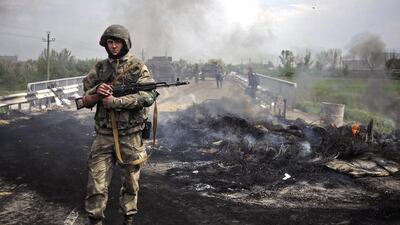GCC investors in Russia are likely to tread cautiously amid a thorny mix of geopolitical tensions and a worsening economy.
Russia has generated pledges to invest billions of dollars in the past two years from investors from the bloc. Most recently, the Russian Direct Investment Fund (RDIF), set up by the president Vladimir Putin three years ago, signed a cooperation deal with the Bahraini sovereign wealth fund Mumtalakat Holding last week to pursue potential joint investment opportunities.
Such deals have appeared more risky as Russia’s economy has begun to spiral down and as tensions with neighbouring Ukraine escalate.
“Gulf authorities will move prudently in light of the sanction risks impacting its dealings with Russia, and the risk to Russia’s economy from the crisis impacting business conditions there,” said Bryan Plamondon, senior manager, Middle East and North Africa at IHS Group, the research and analytics company. “The GCC will also be cognisant to avoid straining its relations with the US and EU while negotiations to resolve the crisis continue.”
Shortly after Mumtalakat inked its deal with RDIF at a forum in Moscow aimed at enhancing economic ties between the two countries, the United States issued a statement raising concerns about the agreement. “This is not the time for any country to conduct business as usual with Russia,” a state department official said. In response, the Bahrain Economic Development Board said the forum was part of an increase in bilateral engagement with Russia since 2008 and was aimed at building existing trade links and attracting investment into Bahrain.
The US and Europe last week rolled out fresh sanctions against a range of new Russian officials and business entities in a move aimed at stemming military activity by Russia and its Ukrainian allies in eastern Ukraine. Although the RDIF is not targeted by the sanctions, one of the members of its supervisory board – Mr Putin’s chief of staff Sergei Ivanov – was included on the US sanctions list in March.
Long before any tensions emerged with Ukraine, several other GCC investors had unveiled plans to invest in Russia. Mubadala Development, the Abu Dhabi government-owned strategic investment company, last June announced the launch of a US$2 billion co-investment fund with the RDIF to pursue opportunities in Russia. A spokesman for Mubadala said no deals had been executed in the fund as of yet. Then in September, Abu Dhabi Department of Finance signed a cooperation deal, committing it to invest up to $5 billion in Russian infrastructure projects under an investment partnership with RDIF. Nobody was available to comment from the department. Kuwait’s sovereign wealth fund, Kuwait Investment Authority (KIA), signed a similar agreement with RDIF in June 2012.
The heads of Mubadala, Mumtalakat, KIA and Qatar’s sovereign wealth fund sit on the RDIF’s international advisory board alongside senior representatives from investment funds in Italy, South Korea, China and Japan and leading US and European private equity players including Blackstone Group.
In an interview with Bloomberg TV last week, Stephen Schwarzman, the chairman and chief executive of Blackstone Group and also a member of RDIF’s international advisory board, said it was a time to “watch and wait” how the Russia situation evolved.
Hailed as one of the fast-emerging Bric economies by the then Goldman Sachs head of research Jim O’Neill in 2001, Russia’s economy has cooled more recently as a commodity boom has unwound and the need for structural reforms have become more pressing.
With the addition of the Ukraine crisis, Russia’s economy has buckled further. Capital flights in the first three months of the year crossed $60 billion and the rouble has plummeted more than 7 per cent against the US dollar. The IMF last week cut its growth forecast for this year to 0.2 per cent from 1.3 per cent, warning of “considerable downside risks”.
Alexey Busev, the chairman of the commission of UAE-Russia economic relations at the Moscow Chamber of Commerce and Industry, remained positive about the outlook for investment.
“Last year was the peak of activity so far in economic ties between the GCC and Russia and we’re hoping this year will be even better,” he said. “Russia is booming in real estate and infrastructure and there’s a lot of potential [to invest].”
Some UAE companies remain active in the market. The Dubai-based building company Arabtec Holding last month affirmed its commitment to Russia, saying its construction of the Gazprom tower in St Petersburg was “well on its way”. It said it also planned to develop further opportunities.
Meanwhile, the developer Limitless last month said it was handing over 338 apartments and 46 town houses in the Zagorodny Kvartal project in Moscow it was completing with Russia’s RDI Group. A spokeswoman for Limitless last week declined to comment on the company’s future in the market.
tarnold@thenational.ae
Follow us on Twitter @Ind_Insights

